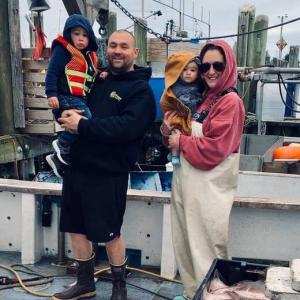James Leonard

Young Fishermen in the Northeast United States
Interviews with 39 fishers between the ages of 18-35, located along the US East Coast from Maine to North Carolina. Collectively, they represent a wide variety of gear types and fisheries. All had been fishing full-time for at least two years and wanted to make fishing their career. They describe motivations for choosing a fishing career, strategies used, barriers encountered, and facilitating factors that have enabled interviewees to defy the graying trend to become successful fishermen.
Please visit the Voices SoundCloud page to explore clips and stories that relate to this collection.
Sarah Schumann
James Leonard, 34 years old at the time of the interview, is the owner-operator of the F/V Briana James, an inshore dragger in Point Judith, RI. James comes from a fishing family and spent his twenties working on large offshore freezer vessels to save money. Then, with indispensable moral support from his wife and the boat-building expertise of his extended family, he brought a boat down from Nova Scotia and spent over a year rebuilding it for dragging in Rhode Island.
Scope and Content Note
James Leonard discusses his journey as a young fisherman, starting from his childhood experiences of lobstering with his uncle and gradually progressing to becoming the captain of his own commercial fishing boat.
During his first full season operating the new boat, the Covid-19 pandemic struck, causing local dealers to shut their doors. “All of a sudden, I start fishing, and then we start hearing about this ‘pandemic’ or this ‘virus,’" Leonard recalls. “I remember coming in one day. I had a really nice trip on. I had a couple thousand dollars in fish. But I had to throw it overboard, because [the dealers] were closed. I don’t understand. I just poured every single thing I had into this boat. What do you mean, you’re not taking my fish?” Forced to innovate, James was one of a few pioneers to took advantage of a new state program allowing fishermen to sell fish direct to consumers from their boats. He describes the ups and downs of this experience in his interview, while evoking hope in a steadier future ahead.
He discusses at length the COVID-19 pandemic, which led to a drop in fish prices, making it challenging for him to sustain his fishing operations. He talks about his dockside sales during the COVID-19 pandemic and describes how he initially started the dockside sales without fully understanding the rules and regulations and received a violation from the Department of Environmental Management (DEM). He notes the need for more publicity to promote dockside sales as a viable option for selling fresh-caught, wild fish to the public. He also reflects on the graying of the fleet phenomenon, suggesting that the fishing industry needs more young people interested in hands-on work and willing to embrace the challenges and excitement of the ocean. However, he says that the cost of entry and lack of proper training programs might discourage younger generations from pursuing fishing careers.
Please Note: The oral histories in this collection are protected by copyright and have been created for educational, research and personal use as described by the Fair Use Doctrine in the U.S. Copyright law. Please reach out Voices@noaa.gov to let us know how these interviews are being used in your research, project, exhibit, etc. The Voices staff can help provide other useful resources related to your inquiry.
The NOAA mission is to understand and predict changes in climate, weather, oceans, and coasts, to share that knowledge and information with others, and to conserve and manage coastal and marine ecosystems and resources. The Voices Oral History Archives offers public access to a wide range of accounts, including historical materials that are products of their particular times, and may contain offensive language or negative stereotypes.
Voices Oral History Archives does not verify the accuracy of materials submitted to us. The opinions expressed in the interviews are those of the interviewee only. The interviews here have been made available to the public only after the interviewer has confirmed that they have obtained consent.
